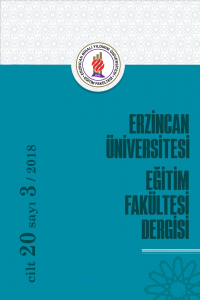Öz
21.
Yüzyılın en hızlı gelişim gösteren disiplinler arası bilimlerinde olan
nanoteknoloji hakkında, gelecek nesli yetiştirecek olan öğretmen adaylarının
algıları oldukça önemli bir konudur. Bu kapsamda bu araştırmanın amacı,
biyoloji öğretmen adaylarının nanoteknoloji bilim dalına yönelik algılarını
incelemektir. Araştırmanın örneklemini 2014-2015 öğretim yılında Hacettepe
Üniversitesi Biyoloji Eğitimi Anabilim Dalı’nda eğitim gören toplam 138
öğrenciden ulaşılabilen 91 öğrenci oluşturmaktadır. Yarı yapılandırılmış iki
açık uçlu sorudan oluşan veri toplama aracı ile nitel veriler içerik analizi
ile yorumlanmıştır. Araştırma sonucunda elde edilen bulgulara göre, biyoloji
öğretmen adaylarının nanoteknolojiye yönelik algılarının yüksek olduğu
söylenebilir.
Anahtar Kelimeler
Kaynakça
- Balemen, N. (2009). Biyoloji öğretmen adaylarının nanobiyoteknoloji konularındak bilgi seviyelerini belirlemesi ve nanobiyoteknoloji öğretim yöntem ve seviyelerinin belirlenmesi. Yayınlanmış Yüksek Lisans Tezi. Gazi Üniversitesi Eğitim Bilimleri Enstitüsü, Ankara.
- Besley, J. C., Kramer, V. L., Priest, S. H. (2008). Expert opinion on nanotechnology: risks, benefits, and regulation. Journal of Nanoparticle Research, 10 (4), 549-558.
- Burri, R. V., Bellucci, S. (2008). Public perception of nanotechnology. Journal of Nanoparticle Research, 10(3), 387-391.
- Cobb, M. D., Macoubrie, J. (2004). Public perceptions about nanotechnology: risks, benefits and trust. Journal of Nanoparticle Research, 6(4),395-405.
- Cobb, M. D. (2005). Framing effects on public opinion about nanotechnology. Science Communication, 27(2),221-239.
- Currall, S. C. (2009). New insights into public perceptions. Nature Nanotechnology, 4(2),79-80.
- Distler, D. (2002). Nanoteilehen İn Megatonnen: Vielfaltige Anwendungen Für Polymerdispersionnen. Basf-Presseinformation 28./29. Oktober, Mannheim.
- Dyehouse, M. A., Diefes-Dux, H. A., Bennett, D. E., Imbrie, P. K. (2008). Development of an instrument to measure undergraduates‟ nanotechnology awareness, exposure, motivation and knowledge. Journal of Science Education and Technology, 17(5),500-510.
- Ekli, E. (2010).İlköğretim ikinci kademe öğrencilerinin nanoteknoloji hakkındaki temel bilgi ve görüşleri ile teknolojiye yönelik tutumlarının bazı değişkenler açısından araştırılması. Yayınlanmamış Yüksek Lisans Tezi. Muğla Üniversitesi Fen Bilimleri Enstitüsü, Muğla.
- Elmarzugi, N. A., Keleb, E. I., Mohamed, A. T., Benyones, H. M., Bendala, N. M., Mehemed, A. I., & Eid, A. M. (2014). Awareness of Libyan Students and Academic Staff Members of Nanotechnology. Journal of Applied Pharmaceutical Science, 4(06): 110-114.
- Enil, G., Köseoğlu, Y. (2016). Fen Bilimleri (Fizik, Kimya ve Biyoloji) Öğretmen Adaylarının Nanoteknoloji Farkındalık Düzeyleri, İlgileri ve Tutumlarının Araştırılması. International Journal of Social Sciences and Education Research, 2(1), 61-77.
- Erkoç, Ş. (2008). Nanobilim ve Nanoteknoloji. Ankara: Odtü Yayıncılık.
- Farshchi, P., Sadrnezhaad, S. K., Nejad, N. M., Mahmoodi, M. & Abadi, L. I. G. (2011). Nanotechnology in the Public Eye: The Case of Iran, as a Developing Country. Journal of Nanoparticle Research, 13(8), 3511–3519.
- Feynman, R. P. (1959). There İs Plenty Of Room At The Bottom: An Invitation To Enter A New Field Of Physics. Erişim Adresi: Http://Www.Zyvex.Com/Nanotech/Feynman.htlm.
- Gök, H. (2007). Fiziksel Tıp ve Rehabilitasyon Uzmanlarının Nanoteknolojiden beklentileri. Türk. Fiz. Tıp Rehab. Derg. 53(2),13-17.
- Kadıoğlu, F. (2010). Fen öğretiminde öğrenim gören öğretmen adaylarının nanoteknoloji ile ilgili güncel ve geleceğe yönelik düşünceleri. Yayınlanmamış Yüksek Lisans Tezi. Gazi Üniversitesi Fen Bilimleri Enstitüsü, Ankara.
- Kahan, D. M., Slovic, P., Braman, D., Gastil, J., Cohen, G. (2007). Affect, values, and nanotechnology risk perceptions: an experimental investigation. Project Report:Cultural Cognition Project at Yale Law School, Woodrow Wilson International Center for Scholars, 22-62.
- Lee, C. J., Scheufele, D. A., Lewenstein, B. V. (2005). Public attitudes toward emerging technologies - examining the interactive effects of cognitions and affect on public attitudes toward nanotechnology. Science Communication, 27(2),240-267.
- Luther, W. (2004). International Strategy And Foresight Report On Nanoscience And Nanotechnology.
- Macoubrie, J. (2005). Informed public perceptions of nanotechnology and trust in government. Project report: Emerging Nanotechnologies, Woodrow Wilson International Center for Scholars, 1-16.
- Macoubrie, J. (2006). Nanotechnology: public concerns, reasoning and trust in government. Public Understanding of Science, 15(2),221-241.Nanoyou, 30 Nisan 2017, http://nanoyou.eu
- Nanotechnology for Schools (2007), 30 Nisan 2017, http://www.nanoscience.cam.ac.uk/schools/links.html
- Nanokids, 30 Nisan 2017, http://www.nanokids.rice.edu
- Nanotech Kids, 30 Nisan 2017, http://www.nanonet.go.jp/english/kids/
- Nanotech School, 30 Nisan 2017, http://www.nanonet.go.jp/english/school/
- Nerlich, B., Clarke, D. D., Ulph, F. (2007). Risks and benefits of nanotechnology: how young adults perceive possible advances in nanomedicine compared with conventional treatments. Health, Risk & Society, 9(2),159-171.
- Pidgeon, N., Rogers, H. T. (2007). Opening up nanotechnology dialogue with the publics: Risk communication or 'upstream engagement'? Health Risk & Society, 9(2), 191-210.
- Ramsden, J.J. (2005). What is nanotechnology?, Nanotechnology Perceptions. 13–17.
- Report Nanoscience and Nanotechnologie (2004). Opportunities and Uncertainties. The Royal Society, 16-17.
- Sheetza, T., Vidalb, J., Pearsonc, T. D., & Lozano, K. (2005). Nanotechnology: Awareness and Societal Concerns. Technology in Society, 27, 329–345.
- Şenocak, E. (2014). A Survey on Nanotechnology in the View of the Turkish Public. Science Technology & Society, 19(1): 79–94.
- Sharifzadeh, M. (2006). Nanotechnology Sector Report. Cronus Capital Markets, 1st Quarter.
- Waldron, A. M., Spencer, D., Batt, C. A. (2006). The current state of public understanding of nanotechnology. Journal of Nanoparticle Research, 8(5),569-575.
- Winkelmann, K., (2013). Learning About the Societal Impacts of Nanotechnology Through Role Playing. Journal of Nano Education, 4(2), 67-81.
- Winkelmann, K., (2014). A Ten Year Review of the National Science Foundation Nanotechnology in Undergraduate Education (NUE) Program. Journal of Nano Education, 6(2), 109-116.
- Yıldırım, A. ve Şimşek, H. (2008). Sosyal bilimlerde nitel araştırma yöntemleri. Ankara: Seçkin Yayıncılık.
Ayrıntılar
| Birincil Dil | Türkçe |
|---|---|
| Bölüm | Bu Sayıda |
| Yazarlar | |
| Yayımlanma Tarihi | 21 Aralık 2018 |
| Kabul Tarihi | 19 Kasım 2018 |
| Yayımlandığı Sayı | Yıl 2018 Cilt: 20 Sayı: 3 |


